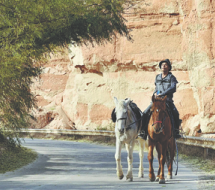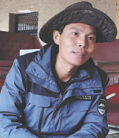Long road to self-discovery
A lawyer and his wife embark on a journey with horses from the country's northwest to the east, Yang Feiyue reports.

Zheng Jingtai was a well-dressed partner at a law firm in Quanzhou, Fujian province, until two years ago. Then, he quit his job to take a break, and along with his wife, Qing Ying, embarked on a journey that took them from the eastern province to the country's northwest and back.
Their return journey to Quanzhou from the Xinjiang Uygur autonomous region was with the help of horses.
The experience won Zheng about 170,000 followers online after he did live broadcasting to share their journey from time to time.
"I had to give up my income and hand my work over to my business partners half a year in advance to ensure the best interests of my clients," recalls Zheng, 39. "I can always make money, but I can live only once, so I had to listen to my inner voice."
For him, it was a choice not so much out of a whim as it was about a search for the meaning of life.
In early 2020, Zheng had then been married for just two years and had about 400,000 yuan ($62,600) in family savings. The couple lived in a rented apartment in downtown Quanzhou. Zheng painted a rosy picture for Qing about the trip to persuade her to go along.
"I told her how romantic it would be to travel across the country, playing with horses and enjoying the sea and blossoms," he says.
He convinced his in-laws about how he had things all planned out for later. Zheng's partners at the law firm were supportive of his decision and would have him back after the trip, he says.
Getting the nod from his family, Zheng got down to preparations. He bought items such as a tent, sleeping bags, solar panels and a satellite phone. The two then left their 1-year-old daughter in the care of their parents and hit the road in March 2020. They first flew to Yining, Xinjiang.
"We were filled with excitement about the unknown," he recalls.
They went straight to local farmers and bought two tough horses for 50,000 yuan. Since there are many uninhabited areas in Xinjiang, some of which might have taken them days to cover, Zheng designed a wagon to carry supplies. "The first one was too light and could easily bump off the road."
So he used the steel and chassis of a motor vehicle to build a wagon that weighed about 200 kilograms and attached it to the horses. Yet, it didn't take long before reality diluted their enthusiasm.
"The horses had trouble climbing steep slopes, and we had to empty the wagon and then upload all over again in such places," Zheng says.
Moments of desperation also sneaked up when a wheel of the wagon broke in the middle of nowhere. "It was all exhausting, in terms of energy and money."
Yet, the stunning natural scenery in such places kept them going.
"At dusk, there were clouds all over the sky, which changed from red to purple as the sun shone on them, much like the nebula," Zheng says, poetically.
Such images "move you to tears and make you feel small in the big universe", he adds.
Monthslong trip
As they struggled with one challenge after another during the journey, they toughened up. Moreover, they learned to enjoy things they wouldn't think about earlier. The couple took delight in seeing places with grass and water.
"Because it meant the horses would have food and water," Zheng says, adding that they had made a point of taking detours in the journey just to get by as much green land as possible, as well as rural households.
"It was also a great joy to find a place to hide right before a storm hit, no matter how wretched it was," Zheng says.
They celebrated whenever they managed to tide over. "It might just be a long tunnel, which could have posed some threats."
Vehicles that drove right past the horses could easily startle them as well. The couple managed to get through such situations without a scratch.
The experiences also forced the couple to pick up survival skills.
"We learned to avoid extreme weather and find directions through the sun when our phone signals were lost," he says.
The couple also had to sweat themselves out while changing horseshoes. They had to become "experts" in picking herbs for the horses, especially after one of their horses fell sick eating a toxic plant by mistake. A police officer passing offered them a ride to a local store, where they bought bottles of yogurt that helped to neutralize the toxin.
"I had tears of joy when I saw the horse getting better," Zheng says.
From then on, whenever they spotted some unfamiliar plants, they would take photos and look them up online. Over 100 days of company had endeared the couple and their horses to each other. "We didn't have to tie them to a tree. They would stay around us."
It took them more than three months in Xinjiang, before they passed through Gansu province, Ningxia Hui autonomous region, and Shaanxi, Hubei and Jiangxi provinces on their way back to Quanzhou.
The couple removed the wagon and rode the horses after they got to Lanzhou, Gansu. They turned heads on the horseback in city streets. Children pursued them out of curiosity, asking them where they were going.
Zheng and Qing spent most nights in their tent. They lost a lot of weight on the way.
"We were often weather-beaten and couldn't get a shower," he says.
Overall, the 6,500-kilometer journey from Xinjiang to Fujian took them 18 months.
An online follower of Zheng's, who calls himself Panda, says Zheng's experience reminds him of his original aspiration of being adventurous and exploring the world.
"Maybe I don't have the courage at the moment, but I will, like he did," the follower writes after watching Zheng's videos of the trip on social media Toutiao.
Mundane joy
Zheng says he felt like he didn't have much time to think of what he really wanted over the past 30 years.
He was born in a poor family in a rural mountainous area in Heilongjiang province and was raised on a meager income from his grandparents after his mother died while giving birth to him. He was at the receiving end of campus bullying in his early school years because he came from a single-parent family.
"Those frustrations made me think about changing the situation," Zheng says.
He buried himself in studies since middle school and eventually was admitted to the Southwest University of Political Science and Law in Chongqing in 2005. When his classmates pursued careers in economically developed areas, including Shanghai, he chose to settle down in a civil servant's position in Ngari prefecture, Tibet autonomous region.
He says he wanted a slow-paced life where he could have more time to think and write poems. But that lasted just about a year. He quit and left for Chongqing where he did legal work and ran a bakery with his friends. He also volunteered for rescue work after the 2008 Wenchuan earthquake in Sichuan province.
Zheng had already traveled on a motorcycle to different places. He once went off to the mountains of Xishuangbanna, Yunnan province, for meditation.
The latest journey has helped Zheng to find peace with himself.
"It sort of made me mature and appreciate the beauty of mundane life," he says. "It never occurred to me how much of an enjoyment it would be to be around my family."
Now, Zheng is back at the law firm in Quanzhou and plans to have a work-life balance.
"Our thinking has merged," says Qing, adding that she believes the journey was a necessary process for her husband. "Life can be half poetic and half mundane."





Today's Top News
- Chinese courts conclude trials of two criminal gangs from northern Myanmar
- China, Germany vital for a changing world
- Xi urges good start to 15th Five-Year Plan period
- Li: Partnership with Germany can help boost global growth
- Around 5% seen as likely GDP target
- Sixth round of Sino-US trade talks expected






























